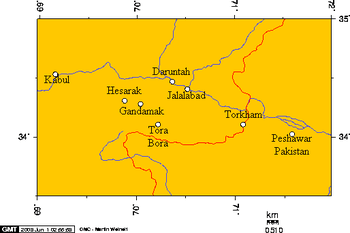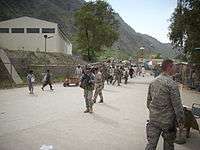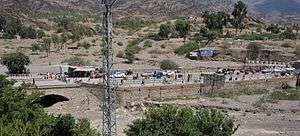Torkham
- Not to be confused with Torkham, Pakistan.
| Torkham | |
|---|---|
|
Torkham border crossing in September 2011 | |
 Kabul, Peshawar, and some cities in Nangarhar | |
| Coordinates: 34°6′53″N 71°5′5″E / 34.11472°N 71.08472°ECoordinates: 34°6′53″N 71°5′5″E / 34.11472°N 71.08472°E | |
| Countries |
|
| Elevation | 2,579 ft (786 m) |
| Time zone | UTC+4:30 |
Torkham (Pashto: تورخم Tūrkham) is one of the major International border crossings between Pakistan and Afghanistan, located on the Torkham international border. It connects Nangarhar province of Afghanistan with Pakistan's Federally Administered Tribal Areas (FATA) and Khyber Pakhtunkhwa. It is the busiest port of entry between the two countries, serving as a major transporting, shipping, and receiving site.[1][2]
Highway 7 connects Torkham to Kabul through Jalalabad.[3] On the Pakistani side, the border crossing is at the end of the N-5 National Highway, which connects it to Peshawar in the east and further connects it to Islamabad by other routes.
The Afghan Border Police and Pakistan's Frontier Corps are the main agencies for controlling Torkham. They are backed by the Pakistani and Afghan Armed Forces. There is also some presence of NATO forces on the Afghan side of the crossing, mainly personnel of the U.S. Armed Forces. The American Forward Operating Base Torkham (FOB Torkham) is located a few miles from the crossing in Nangarhar province. Torkham belongs to the Momand Dara district of Nangarhar.
History
The location has been used throughout history by Afghan and Turkic caravans, including marching armies of powerful empires. Most of these were on their way to Northern India, passing through Peshawar and then Lahore. Some of the well known regional historical figures who are believed to have passed through Torkham are Chandragupta Maurya, Hsüan-tsang, Jayapala, Al-Biruni, Ibn Battuta, Babur, Humayun, Nader Shah, Ahmad Shah Durrani, Zaman Shah Durrani, Dost Mohammad Khan, and Akbar Khan.
Over much of the last century, there have been proposals to extend the (defunct) Khyber rail service to Afghanistan and possibly beyond, passing through Jalalabad. These proposals have the support of the current Afghan government. In recent years, Pakistan and Afghanistan signed a Memorandum of understanding (MoU) for going ahead with the laying of rail tracks between the two countries. Work on the proposed project was supposed to start in 2010.[4]
In November 2001 the New York Times reported that Torkham is Hazrat Ali's hometown. Ali was an anti-Taliban militia leader who seized power after the Taliban retreated.[5] It was reported that Hazrati Ali had joined forces with two other militia leaders, Mawlawi Yunis Khalis, and Ezatullah, to set up a regional provisional government.
On the Pakistani side, Torkham lies at the end of the N-5 National Highway. It is connected to city of Peshawar in the east. Transported goods arrive to Tokham from the port city of Karachi in Sindh province. Torkham is 5 kilometres (3.1 mi) west of the summit of the Khyber Pass. It lies on the most important supply route for US-led NATO forces in Afghanistan. Pakistan's government sometimes block supplies due to the American use of drone strikes in Pakistan.[6][7]
In April 2006 the Afghan Border Police began requiring travelers crossing the border at Torkham to possess valid travel documents.[1][8]
Pakistan has completed the construction of border gate, crossing terminal and other associated infrastructure on its side of Torkham border by July 2016. Border gate has been named as Bab-i-Pakistan and the crossing terminal has been named "Shaheed Major Ali Jawad Changezi terminal" after the officer lost his life in skirmishes against the Afghan security forces at the same border and in the clashes that resulted from the construction of this very gate. The flag hosting ceremony has also started just like the one at Wagah border crossing with India. Now no one will be allowed to cross border without proper documentations to check the infiltration of terrorists from Afghanistan into Pakistan. Work on the construction of the gate and associated facilities began in 2014 but kept getting delayed because of Afghan reservations and abrupt clashes. Pakistan plans to have similar border control measures at all six major crossing points between the two countries on the 2,600km-long porous border. [9]
Climate
With an influence from the local steppe climate, Torkham features a hot semi-arid climate (Köppen BSh). The average temperature in Torkham is 20.3 °C, while the annual precipitation averages 407 mm. June is the driest month with an average rainfall of 8 mm, while the wettest month is March, with an average 82 mm of precipitation.
June is the hottest month of the year with an average temperature of 31.0 °C. The coldest month January has an average temperature of 8.4 °C.
| Climate data for Torkham | |||||||||||||
|---|---|---|---|---|---|---|---|---|---|---|---|---|---|
| Month | Jan | Feb | Mar | Apr | May | Jun | Jul | Aug | Sep | Oct | Nov | Dec | Year |
| Average high °C (°F) | 14.5 (58.1) |
16.3 (61.3) |
20.9 (69.6) |
26.1 (79) |
32.2 (90) |
38.0 (100.4) |
36.6 (97.9) |
34.8 (94.6) |
33.4 (92.1) |
28.8 (83.8) |
21.9 (71.4) |
16.4 (61.5) |
26.66 (79.97) |
| Daily mean °C (°F) | 8.4 (47.1) |
10.5 (50.9) |
15.0 (59) |
19.9 (67.8) |
25.6 (78.1) |
31.0 (87.8) |
30.8 (87.4) |
29.5 (85.1) |
27.1 (80.8) |
21.4 (70.5) |
14.5 (58.1) |
9.7 (49.5) |
20.28 (68.51) |
| Average low °C (°F) | 2.3 (36.1) |
4.7 (40.5) |
9.1 (48.4) |
13.7 (56.7) |
18.7 (65.7) |
24.0 (75.2) |
25.1 (77.2) |
24.2 (75.6) |
20.8 (69.4) |
14.1 (57.4) |
7.2 (45) |
3.1 (37.6) |
13.92 (57.07) |
| Source: Climate-Data.org[10] | |||||||||||||
Gallery
 US soldier on the Afghan side of Torkham in 2007
US soldier on the Afghan side of Torkham in 2007 Combined Joint Task Force 82nd Soldiers and logistics units walk the Torkham border crossing area with CENTCOM Deployment and Distribution Operations Center Director, U.S. Air Force Maj. Gen. Robert McMahon, March 25, 2010, Torkham, Afghanistan.
Combined Joint Task Force 82nd Soldiers and logistics units walk the Torkham border crossing area with CENTCOM Deployment and Distribution Operations Center Director, U.S. Air Force Maj. Gen. Robert McMahon, March 25, 2010, Torkham, Afghanistan. Combined Joint Task Force 82nd Soldiers and logistics units walk the Torkham border crossing area with CENTCOM Deployment and Distribution Operations Center Director, U.S. Air Force Maj. Gen. Robert McMahon, March 25, 2010, Torkham, Afghanistan.
Combined Joint Task Force 82nd Soldiers and logistics units walk the Torkham border crossing area with CENTCOM Deployment and Distribution Operations Center Director, U.S. Air Force Maj. Gen. Robert McMahon, March 25, 2010, Torkham, Afghanistan. Trucks crossing into Pakistan's Federally Administered Tribal Areas (FATA) at Torkham in 2011
Trucks crossing into Pakistan's Federally Administered Tribal Areas (FATA) at Torkham in 2011 Afghanistan's entry point at Torkham
Afghanistan's entry point at Torkham Inside the Afghan customs and border patrol station at Torkham
Inside the Afghan customs and border patrol station at Torkham
See also
- Landi Kotal
- Khyber train safari
- Landi Khana railway station
- Spin Boldak
- Zaranj
- Islam Qala
- Towraghondi
- Hairatan
- Shir Khan Bandar
- Demogan
- Durand Line
References
- 1 2 "ANP secure Torkham border" (PDF). ddrafg.com. April 4, 2006. Retrieved 2008-02-19.
- ↑ Towr Kham Collins Maps. Retrieved 21 January 2011
- ↑ Lt. Col Gordon Phillips and State Department Representative Shawn Waddoups (August 22, 2007). "DoD News Briefing with Lt. Col. Phillips from Afghanistan". United States Department of Defense. Retrieved 2008-02-10.
- ↑ Pakistan, Afghanistan ink MoU on rail links
- ↑ David Rohde (November 16, 2001). "A NATION CHALLENGED: AFGHANISTAN REDUX; Warlord Rule Is Re-emerging In Some Towns". New York Times. Retrieved 2008-02-19.
- ↑ Pakistan blocks fuel to US forces, SEPTEMBER 06, 2008
- ↑ "Pakistan 'to reopen key NATO Afghanistan supply route'". BBC News. 2010-10-09. Retrieved 2010-10-09.
- ↑ "Afghan Police Secure Towr Kham Border". American Forces Press Service. April 10, 2006. Retrieved 2008-02-18.
- ↑ http://dailytimes.com.pk/pakistan/28-Jul-16/torkham-gate-titled-as-bab-i-pakistan
- ↑ "Climate: Torkham - Climate-Data.org". Retrieved 9 September 2016.
External links
| Wikimedia Commons has media related to Torkham. |
